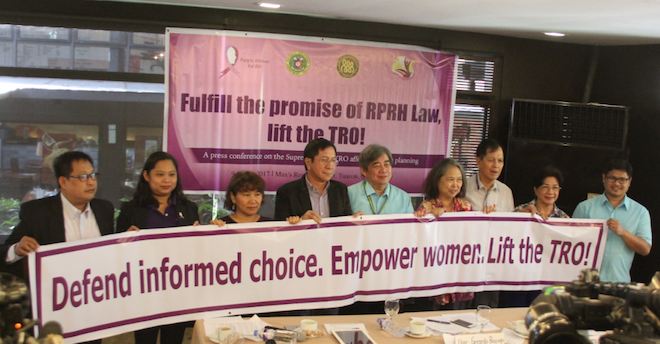Supreme Court justices urged to lift TRO affecting family planning
March 9, 2017
Advocacy group Philippine Legislators’ Committee on Population and Development (PLCPD), one of the pro-reproductive health (RH) organizations that had pushed for the enactment of the Responsible Parenthood and Reproductive Health (RPRH) Law in Congress, implored the justices of Supreme Court to lift the temporary restraining order (TRO) it issued on public promotion, procurement, and distribution of select contraceptives and preventing the Food and Drug Administration (FDA) to issue registration and re-certification of family planning products, affecting many Filipinos’ access to much needed services.
Mr. Romeo Dongeto, PLCPD Executive Director, made this call during a press conference together with the Department of Health (DOH) Undersecretary Gerardo Bayugo and Commission on Population Executive Director Juan Antonio Perez III.
“It is lamentable that almost five years since its enactment, the agencies tasked to implement the law cannot focus on implementing but are instead occupied with addressing legal issues such as this TRO,” Dongeto said.
Enacted in December 2012, Republic Act 10354 or the RPRH Law institutionalizes reproductive health program in the country by providing for the following: maternal health care, almost access to family planning, information and education to reproductive health, and funding.
Since then, the law has faced several challenges before the Supreme Court as its oppositors contested its constitutionality, and, after the SC ruled that the law is constitutional, questioned the procedure by which the FDA certified select family planning products, which prompted the SC to issue the TRO on public promotion, procurement, and distribution of two brands of contraceptive implants. In August 2016, after a Motion for Reconsideration had been filed by the government, the SC denied the government’s motion and expanded the TRO to cover other contraceptive products available in the Philippine market.
“To date, the most serious challenge to the implementation of the RPRH Law is this SC decision, which would result in contraceptive stockout in the country if it remains unresolved and affecting more than 13 million Filipino women,” said Dongeto.
“Addressing unmet need for family planning is a big step towards fulfilling Filipinos’ reproductive health and rights as enshrined in the RPRH Law. However, the biggest obstacle to the full implementation of the RPRH Law remains to be the Supreme Court’s TRO on family planning. We hope that this Women’s Month, the Supreme Court will finally decide in favor of the rights and health of Filipinos, especially women. We also call on the public to join us in this call,” he added.
Dongeto also announced that Purple Ribbon for RH, a broad network of RH advocates in the country, will once again embark on a nationwide campaign calling for the lifting of the TRO. It can be recalled that the group launched a signature campaign on the TRO in November.
RH advocates warn that the delay in full implementation of the law will exacerbate the already less than desirable RH situation in the country. Thus, there is a need to sustain the advocacy, inform the public of the current situation, and resolve the issue in order to see the effects of the law.

